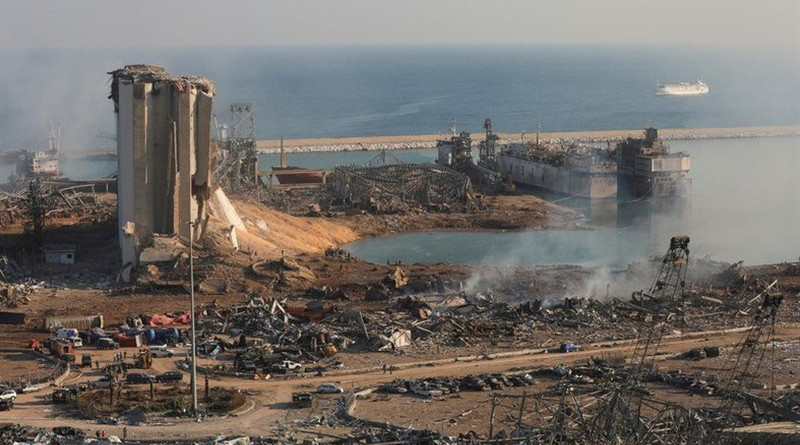Lebanon: Beirut Blast Investigation Falters As Judge Removed From Case
By Arab News
By Najia Houssari
Six months on from the deadly explosion in Beirut Port, the investigation into its causes has gone back to square one. Lebanon’s court of cassation on Thursday removed Judge Fadi Sawan from the case, after a request from two of the former ministers he had charged — Ali Hassan Khalil and Ghazi Zeaiter.
Youssef Fenianos, former minister of public works, was due to be questioned on Thursday but said he would not turn up because he did not receive a formal summons, he claimed.
The court’s unanimous decision was expected. Two months ago, Khalil and Zeaiter, who had also refused to be questioned over the Beirut blast, submitted a request to remove Sawan from the case because of “legitimate suspicions” over his neutrality.
A judicial source told Arab News: “The court’s decision was based, in addition to ‘legitimate suspicion,’ on another argument: Sawan’s house in Ashrafieh was damaged by the blast, (for which) the judge received 13 million Lebanese pounds from the High Relief Committee in compensation.”
Sawan has faced political pressure since the investigation into the blast — which killed 202 people, injured more than 6,000, wrecked thousands of homes and destroyed Lebanon’s main grain silo — began, having issued several arrest warrants against senior port officials and security officers.
He was also criticized for summoning the prime minister of the caretaker government, along with current and former ministers, to question them about 2,750 tons of ammonium nitrate, which had been stored unsafely for more than six years at the port.
The media, too, has been campaigning against Sawan. On Thursday, he was accused by Lebanon’s pro-Hezbollah newspaper Al-Akhbar of “heresy.”
Marie-Claude Najm, Lebanese justice minister, is expected to nominate another judge to take over from Sawan, but any appointment must be approved by the Supreme Judicial Council.
The judicial source also told Arab News: “The new judge will study the case again and might annul the decisions of Sawan regarding the measures taken against those who have been detained.”
The source described any new judge agreeing to handle the investigation as “suicidal.”
Media and activists criticizing the state’s performance are also the subjects of political pressure. On Thursday, activist Rami Fanj was released after being arrested on Wednesday for feeding the poor in the city. A campaign was launched on social media and in Tripoli to voice support and solidarity with Fanj.
Fanj said he was interrogated about “the source of funding to distribute food.” He added: “Even if they consider that feeding the poor is a crime, we will not stop.”
Meanwhile, the parliamentary Media and Communications Committee has summoned the chairmen of local TV stations to “address some media incidents that have occurred lately,” according to the head of the committee and Hezbollah lawmaker Hussein Al-Haj Hassan.
Al-Haj Hassan said: “Some mistakes must be addressed, such as conspiring to incite sedition, threatening national stability and security, inciting sectarian and confessional strife, and falsely accusing someone of murder, without relying on investigations.” Hassan was likely referring to widespread accusations that Hezbollah was responsible for the killing of the prominent anti-Hezbollah critic and activist Luqman Slim two weeks ago. Several pro-Hezbollah figures have launched their own protests over those accusations.
Joseph Kossaifi, president of Lebanon’s Syndicate of Press Editors, revealed to Arab News that a meeting will be held on Friday in the presence of political media offices’ heads, asking politicians to “carefully and responsibly choose their words while talking on TV channels in order not to hold media outlets responsible for any insults and accusations.”
“When MP Al-Haj Hassan summoned the chairmen of TV stations to parliament, he did not consult us. Nobody can cover the mouths of journalists or anyone else. The country is in complete chaos and politicians must choose their words carefully,” added Kossaifi.
Lebanon’s Kataeb and Progressive Socialist Party criticized what it described as an “attempt to make Lebanon a police state and oppress others’ opinions and media freedom.”

